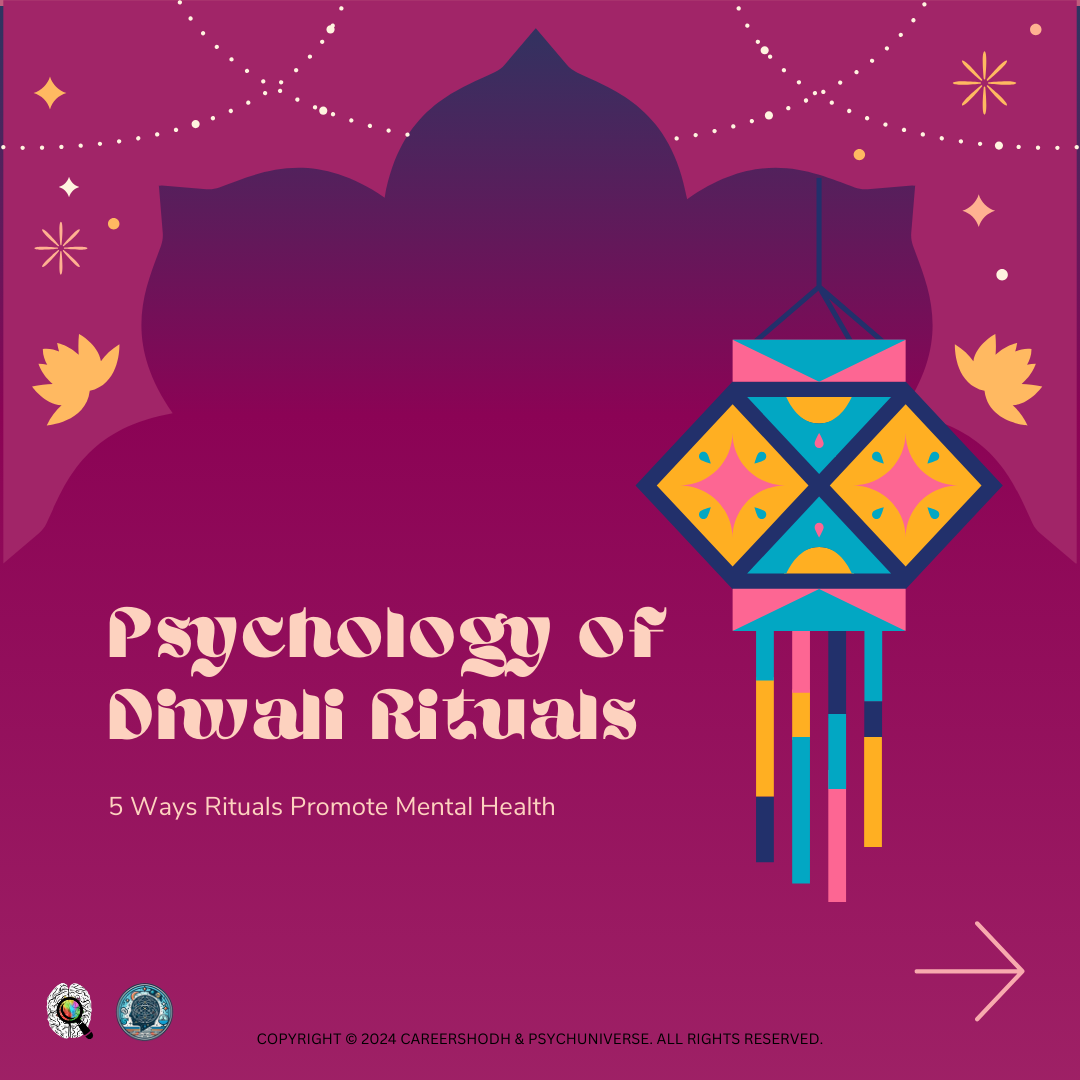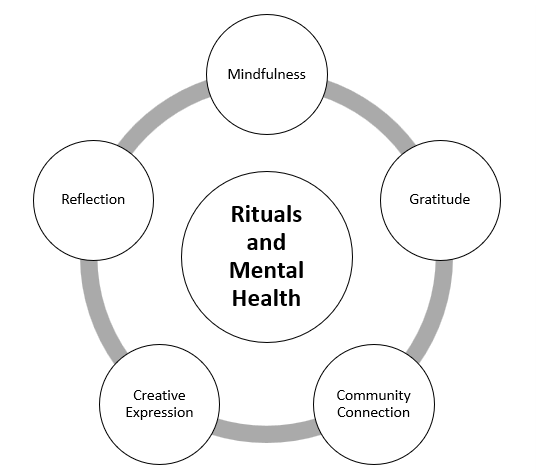Psychology and Diwali Rituals
As the festive lights of Diwali illuminate homes across the globe, it’s not just the physical glow that brightens our spirits; the rituals and practices surrounding this vibrant festival play a crucial role in enhancing mental health. By fostering mindfulness, gratitude, and a strong sense of community, Diwali rituals can serve as powerful tools for improving emotional well-being. Let’s delve into how these traditions contribute to a healthier mind while enjoying the festive spirit!

Diwali- A Festival of Lights and Meaning
Diwali or Dipawali , known as the Festival of Lights, is celebrated by millions of people worldwide, primarily in India and among the Indian diaspora. It symbolizes the triumph of light over darkness and good over evil.
Stress Relief and Positivity: The festive atmosphere, social gatherings, and rituals like lighting diyas and bursting crackers can reduce stress and anxiety by fostering joy, celebration, and positivity.
Symbol of Hope: Lighting lamps is a powerful symbol of hope, helping people overcome personal challenges, instilling optimism, and encouraging resilience.
Emotional Cleansing: Letting go of past negativity, grudges, or conflicts, especially through the ritual of forgiveness and bonding with family and friends, provides emotional release and promotes mental well-being.
Celebrations typically involve lighting oil lamps (diyas), decorating homes, sharing sweets, and engaging in various rituals that promote a sense of community and connection.

1.Mindfulness
One of the central themes of Diwali is mindfulness, a practice rooted in being present and fully engaged in the moment. The preparation for Diwali begins days in advance, with families cleaning their homes, selecting decorations, and cooking special foods. Each of these tasks encourages mindfulness, as individuals focus on the sensory experiences—like the scent of spices or the sight of glowing diyas—that characterize the festival.
Some Easy Ways to Incorporate Mindfulness in Your Day-
- Morning Ritual- Start the day with a few minutes of meditation or deep breathing to centre yourself and set a positive tone for the day.
- Mindful Decoration- When decorating the house with diyas (lamps) or rangoli, focus fully on the activity, paying attention to each colour, shape, or design you create. This brings you into the present moment.
- Savor Food- During festive meals, slow down and appreciate the Flavors and textures of the special Diwali dishes you’re eating.
Engaging in these rituals helps divert attention from daily stressors and fosters a state of flow—a mental state where individuals lose track of time and become fully immersed in their activities. Sudhir Kakar, a prominent Indian psychoanalyst, highlights the significance of rituals in providing structure and meaning to life. He argues that rituals serve as a bridge between the individual and the collective, offering a sense of stability and continuity in an ever-changing world (Kakar, 1990). This perspective underscores how the mindful engagement in Diwali rituals can significantly reduce anxiety and enhance overall well-being.
Read More- Mindfulness
2. Gratitude
Another important aspect of Diwali is the practice of gratitude. During this festival, individuals often reflect on their lives and express thankfulness for their family, friends, and the abundance they enjoy. Rituals such as the Lakshmi Puja (worship of the goddess of wealth and prosperity) are opportunities for families to come together, express their hopes for the future, and appreciate what they have.
Some Easy Ways to Incorporate Gratitude in Your Day-
- Gratitude Jar- Place a jar in a central location in your home and invite family members to write down what they’re grateful for each day of Diwali. Read them together on the last day of the festival.
- Thank You Notes- Write or call friends and family to express gratitude for their presence in your life. You can send digital messages or handwritten notes.
- Gratitude Reflection- Before bed, take a moment to reflect on three things you are thankful for from the day—small acts of kindness, festive experiences, or the people around you.
Many families also engage in the tradition of exchanging gifts and sweets, which fosters a sense of connection and appreciation. This practice can be a delightful way to express love and gratitude to loved ones, reinforcing social bonds. Research suggests that practicing gratitude can lead to improved mental health. A study by Emmons and McCullough (2003) found that participants who kept gratitude journals reported higher levels of positive emotions and satisfaction with life. By incorporating gratitude into Diwali celebrations, individuals can cultivate a more optimistic outlook and foster resilience against life’s challenges.
Kakar also emphasizes the role of gratitude in personal development, stating that recognizing and appreciating one’s resources and relationships fosters a sense of belonging and self-worth (Kakar, 1991). This is particularly significant during Diwali when gratitude becomes a communal practice, enhancing social cohesion and individual mental health.
Read More- Gratitude Journal
3. Community Connection of Diwali
Diwali is not just a personal celebration; it is a communal event that brings people together. The festival emphasizes social interaction, with families and friends gathering to share meals, Diwali Farhal, exchange Diwali gifts, and participate in Pooja, communal prayers. This sense of community is crucial for mental health, as social connections have been shown to enhance well-being and reduce feelings of loneliness (Holt-Lunstad et al., 2010).
Some Easy Ways to Incorporate Community Connection in Your Day-
- Diwali Cleanup Drive- Organize or participate in a community cleanup before Diwali. It not only helps your neighborhood look great but also fosters a sense of shared responsibility.
- Neighborhood Lighting- Encourage neighbors to participate in lighting up the streets with diyas or candles in a collective way. This strengthens the feeling of togetherness.
- Gifting- Make small gift baskets or sweets to share with neighbours, friends, and those in need, spreading the joy of the festival.
In many neighbourhoods, Diwali celebrations extend beyond the home, with local communities organizing events that include cultural performances, food stalls, and fireworks. These shared experiences strengthen community bonds and create a sense of belonging. Engaging in communal festivities allows individuals to connect with others who share similar cultural backgrounds and values, fostering a sense of identity and pride.
Kakar notes that rituals like Diwali serve to affirm community bonds and cultural identity, which can be particularly important in diverse societies where individuals may feel marginalized or disconnected (Kakar, 1990). This community aspect is vital for mental well-being, as belonging to a group provides emotional support and a sense of security.
Additionally, many Diwali celebrations involve acts of kindness and charity, such as donating to those in need or sharing sweets with neighbours. Engaging in altruistic behaviours not only benefits others but also contributes to the giver’s happiness, creating a positive feedback loop that reinforces mental well-being. This practice not only uplifts those who receive but also instils a sense of purpose and fulfilment in those who give.
4. Creative Expression in Diwali
The creative aspects of Diwali—like making decorative rangoli or crafting elaborate decorations—provide an excellent outlet for self-expression. Engaging in creative activities can be therapeutic, allowing individuals to explore their emotions and relieve stress. For many, the art of creating intricate rangoli designs becomes a meditative practice, drawing focus and calming the mind.
Some Easy Ways to Incorporate Creative Expression in Your Day-
- Rangoli Design- Involve the whole family in creating rangolis, trying new patterns and colours. This fosters a spirit of creativity and collaboration.
- DIY Crafts- Create handmade lanterns, diyas, or Diwali-themed greeting cards to decorate your home or share with others.
- Festive Cooking- Get creative in the kitchen by experimenting with traditional recipes and adding your own twist. Involve kids in the process by decorating sweets.
Research found that creativity is linked to increased happiness and a greater sense of purpose (Forgeard & Elstein, 2014). Whether it’s painting, crafting, or cooking, the creative expression inherent in Diwali preparations allows individuals to tap into their imaginations and share their personal touch with their surroundings.
Kakar suggests that creative rituals not only provide an outlet for emotional expression but also foster a sense of identity and cultural continuity (Kakar, 1990). This cultural dimension is particularly relevant during Diwali when individuals engage in traditional art forms, allowing for both personal expression and cultural storytelling.
5. Reflection and Renewal in Diwali
Beyond the excitement and festivities, Diwali also offers an opportunity for reflection and renewal. As the year draws to a close, many people take time to assess their lives, set intentions, and focus on personal growth. This practice can be incredibly therapeutic, providing a structured way to confront challenges, celebrate achievements, and embrace new beginnings.
Some Easy Ways to Incorporate Reflection in Your Day-
- Light a diya mindfully- Setting an intention to release stress or invite peace, symbolizing new beginnings.
- Spend device-free time with loved ones- Focusing on deep connection and shared memories for a meaningful celebration.
- Write a Diwali journal entry- Reflecting on personal growth over the year and setting a few simple intentions for the future.
Meditative practices, such as prayer and mindfulness, are often integrated into Diwali celebrations. Families may spend quiet moments together in reflection, lighting candles or incense to symbolize the dispelling of negativity. This spiritual aspect fosters inner peace and clarity, helping individuals centre themselves amid the chaos of festive preparations. Kakar points out that the spiritual dimension of rituals is essential for psychological well-being, as it allows individuals to connect with something larger than themselves, providing meaning and purpose (Kakar, 1991).
Read More- Reflection Journal
Conclusion
As we celebrate Diwali, it’s essential to recognize the profound impact that rituals associated with this festival can have on our mental health. By promoting mindfulness, fostering gratitude, strengthening community ties, and encouraging creative expression, these practices contribute to improved emotional well-being.
So, this Diwali, let’s embrace the rituals and traditions that not only light up our homes but also illuminate our minds and hearts. As we share laughter, meals, and memories, let’s remember the importance of mindfulness and gratitude in cultivating a healthier, happier life.
Incorporating these practices into our daily lives, beyond just the festival, can create lasting benefits for our mental health. Let’s carry the spirit of Diwali—of joy, gratitude, and togetherness—throughout the year, ensuring that the light of this festival continues to shine brightly in our hearts.
References
Emmons, R. A., & McCullough, M. E. (2003). Counting blessings versus burdens: An experimental investigation of gratitude and subjective well-being in daily life. Journal of Personality and Social Psychology, 84(2), 377-389.
Forgeard, M. J., & Elstein, J. (2014). The role of creativity in enhancing well-being. Journal of Positive Psychology, 9(1), 53-65.
Holt-Lunstad, J., Smith, T. B., & Layton, J. B. (2010). Social relationships and mortality risk: A meta-analytic review. PLoS Medicine, 7(7), e1000316.
Kakar, S. (1990). The Inner World: A Psycho-analytic Study of Childhood and Society in India. Oxford University Press.
Kakar, S. (1991). The analyst and the mystic: Psychoanalytic reflections on religion and mysticism. University of Chicago Press.
Subscribe to PsychUniverse
Get the latest updates and insights.
Join 3,044 other subscribers!
Niwlikar, B. A. (2024, October 31). Psychology of Diwali Rituals- 5 Important Benefits of Rituals. PsychUniverse. https://psychuniverse.com/psychology-of-diwali-rituals/



